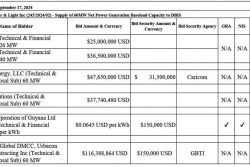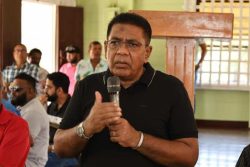The Guyana Human Rights Association today welcomed a government announcement last week of an immediate ban on river bank mining.
A statement from the GHRA follows:
The Guyana Human Rights Association (GHRA) welcomes the announcement by President Granger of the Government of Guyana’s signing of the Paris Agreement on climate change and his stated intention that Guyana will ratify this Agreement before the end of the year. ‘Signature’ indicates agreement and support of the content, ‘ratification’ on the other hand indicates acceptance of an international legal responsibility to implement the substance of the Agreement.
The event in New York represented the launch of the document agreed upon at COP21 in Paris in December 2015. Only fifteen States were prepared to ratify the new Treaty and requires a further forty before it comes into effect. The Agreement sets out a global action plan to put the world on track to limit global warming to 1.7°C – 2°C.
The President’s action on climate change comes hard on the heels of the welcome news earlier in the week from the Minister of Natural Resources, Raphael Trotman, on the re-introduction of the ban on river mining.
The fact that the announcement was followed by TV notices drawing the attention of miners to the ban suggests a stronger determination to implement the ban than was the case with a similar ban in 2012. On that occasion, the weaker restriction – a suspension of new licenses for river mining – was withdrawn after a month following an uproar from the mining community. The new ban makes clear that all mining on buffer zones, that is, land within thirty feet of the river bank, is closed to mining.
Without effective regulation, pollution of headwaters of many rivers coming off the Guyana Shield by mining activity will simply destroy this asset, unless adequate regulation is seriously enforced. Moreover, enforcement of the real costs of land and river reclamation is urgently needed, and failure to face up to this reality is another form of climate denial.
Environmental advocates, both indigenous and coastal, looking for more aggressive rights-related protection of Guyana’s fresh water sources will welcome this signal that the Government of Guyana is conscious of its global responsibilities for the 30% of the world’s fresh water generated from the Amazon Basin. As with the Congo basin in Africa, the world’s other major source of fresh water, protection of the Amazon has been a low priority for most Amazonian countries.
In contrast to protecting water, the other major area of strategic thinking urgently needed in Guyana relates to fresh water as opportunity. At a time when Trinidad, Barbados and the French Caribbean territories are considering rationing or at a minimum feel the need to assure its citizens they possess adequate reserves, it is not rocket science to foresee how valuable fresh water will become in the not-too-distant future. We have seen wars fought for oil in the past decade and, according to UN estimates, wars over freshwater resources will soon be a reality. Desertification of parts of the Middle East have directed impacted on the instability in Syria.
According to the 2013 National Land Use Survey, Guyana’s water resources are adequate for a population of 142 million people, an abundance no doubt fuelling our complacency which stretches to pumping billions of gallons of fresh-water into the Atlantic Ocean, an unheard of mitigation scenario.
Simply raising these questions indicates the need for a new understanding of the society’s relationship with water, the need for an ethics of water, the need to learn to live differently with water and the need for a lot more learning about this problem. How do we adapt? How do we empower those who do not have the means to change livelihoods? How do we educate the society in a socially transformative way, linking the science to the governance of water? What kind of trade-off is acceptable between preserving Guyana’s magnificent natural beauty and mining?




